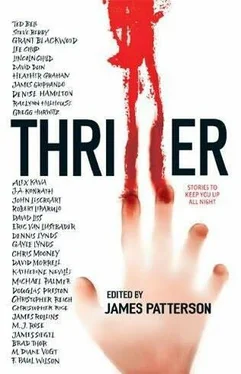Such dangerous terrain and weather as I encountered only served to fuel my misery and sap my confidence on that trek. Slipping and sliding across the island's rocky headland, I grew ever more tired and bone cold. Late in the day, more serious doubts about this adventure inevitably crept round the edges of my mind: one truly nasty fall and my frozen carcass wouldn't be found till next morning.
Still and all, I was determined to reach the old Greybeard Inn before nightfall, for I had arranged a meeting with the proprietor there, a Mr. Martyn Hornby, at the hour of eight o'clock.
At quarter past the hour of seven, I was still on my feet, my face a mask of ice. Uncertain of my next turning, I dug my stiff fingers inside a pocket for my map, but it was soggy and ruined and came away in pieces. My course being westerly, with only the setting sun as my guide, I still believed I might arrive before darkness fell. Time would certainly tell.
The godforsaken place to which I had recently journeyed by sail is a tiny link in an archipelago located off the coast of France. This particular island, by far the smallest of the lot, took its name from the thick, pea-soupy fogs that persistently haunted the place.
It was aptly named Greybeard Island.
The place reminded me a bit of the Skelligs, if you know those two forbidding spires. I once chased down the rare Skellig tern there, the bird flitting about those two rock cathedrals set in the royal-blue Atlantic off the southwest shores of Ireland. The Skel-ligs are remote places, potent in their discomfort. One visit is enough for most, and more than enough for your faithful armchair correspondent.
But I kept putting one boot in front of another that frigid and gloomy evening for one reason. I fervently believed Mr. Hornby could alter the pitiful circumstances of my life.
Martyn Hornby, I had recently learned from his lovely daughter, Cecily, was one of a very small number of Royal Navy veterans of the Napoleonic Wars still alive. He was, as far as I could determine, the sole living survivor of the crew of the HMS Merlin.
This small forty-eight-gun English man-o'-war had fought a courageous and-I'd come to believe-pivotal naval battle against a massive French seventy-four-gun frigate back in '05. When I say pivotal, I do not speak lightly. I mean I believed that the Merlin's victory had changed the course of history.
And no one, to my knowledge, had ever heard tell of it!
Miss Cecily Hornby, a most charming woman in my eyes, had waxed eloquent in her discourse regarding this sea battle. Here, briefly, is what I know of the matter.
Seventy-five years ago now, back in the summer of 1805, a huge French frigate, Mystere, was lurking off this very coast. The reasons for the enemy's presence here at Greybeard Island were unknown. I did know she sailed under the command of the infamous Captain William Blood, an Englishman and a traitor of the first order.
Old Bill was an infamous rogue who had betrayed Admiral Lord Nelson, not for political reasons, mind you, but for a very large sum of capital offered by the French. Captain Blood's formidable services were now at the disposal of Napoleon and his Imperial French Navy.
William Blood was Admiral Lord Nelson's nemesis in those years. And it was only the purest of luck that put that villain at last in British gun sights.
England's very fate was in HMS Merlin's hands that day. Sometime in early July, the heavily armed Mystere engaged in a vicious set-to with the much smaller British ship. As I understood the thing, had not an obscure English captain named McIver and a mysterious passenger aboard Merlin known only as Lord Hawke eked out a victory that fine summer's day, we might all be speaking French.
Surely, I thought, this dramatic encounter, long lost in the swirling mists of history, was the prizewinning tale. For now, I could only dream it were true and hope to prove it.
Subsequent to Cecily's revelations, I commenced a feverish research at the Royal Navy College down at Greenwich. And, finding no record of the engagement, I had determined that, should Martyn Hornby's tale prove credible, I, Pendleton Tolliver, lowly chronicler of church bazaars, tea parties and missing felines, might soon be a wealthy fellow. And, one rewriting the history books in the bargain.
My mind was understandably excited.
Distracted by such thoughts, I slipped then, and nearly lost my footing on a sharply angled escarpment, at the bottom lip of which I spied a cliff, one that dropped some four hundred feet to the sea. Well, I clung to a vertical outcropping of glistening rock and paused, trembling on the edge of the precipice. Once my heart slowed to a reasonable hammering, I pressed on.
Darkness was fully upon me now, and I despaired of not bringing some kind of torch to light my way.
Historians, I was rapidly learning, need an adventurous streak. Tracking down and conversing with far-flung witnesses to history is neither for the faint of heart nor weak of limb. The would-be chronicler of forgotten events must be possessed of a degree of zealotry seldom found outside the pulpit or the sacristy. These, then, were my musings as a sudden thunderclap boomed behind me and lightning strokes danced on the far horizon.
Sodden, hungry, but still determined, I reached a fork in the road. In the gloom, I could make out no stone marker to guide me. To the left, a middling road of crushed stone led off through rain-swept fields to where the halo of a lighthouse shone in the far distance. To my right was a narrow, hard-surfaced pathway that angled sharply down. Below me, I heard the rush of unseen waves bursting themselves repeatedly upon jagged rocks.
The kindly ferryman at the village docks had told how the inn stood on a lower western bluff by the sea. So I chose the harder road descending narrowly along the towering cliff. There was little width to be had on this path, and in some spots it was little more than a shaley rock-cut ledge about ten inches or a foot wide.
The sheer face of rock to my right seemed to bulge, animated, as if it wished to push my body out into space. A trick of mind? Frightened well enough by heights, I inched along, trying to ignore the rising bile of panic and the agitated sea far below my feet. Not once, but now twice, I considered turning back, but quickly realized I had passed the point of no return.
Soon, but not soon enough I'll warrant, I came to a spot where could be seen a jutting arm of rock protruding into the black ocean. At the far end, a warm glow of yellow lights in the rainy gloom. The beckoning two-story house was aglow with promised warmth and food, and my steps quickened.
Realizing what a pitiful sight I would present, I paused outside beneath the pitched eave of the inn and tried to compose myself. I'd worn my one good woolen suit, threadbare but ser-viceable-at least when dry. My poor shoes, heretofore worn only on Sundays, were now ruined. Ah, well, I thought, pulling myself erect and wringing out my hat, I would just put the best face possible on things and hope for a miracle.
I pushed inside the inn's heavy wooden door and found the old Jack-Tar himself, clay-piped and pigtailed, sitting in silence by the fire. I pulled up a chair and introduced myself. Had I the good fortune of speaking to Mr. Martyn Hornby? I inquired with a smile.
"Aye, I'm Hornby," he said, removing his pipe. After a long silence in which clouds of geniality seemed to float above the man's head, he spoke.
"Weather slowed you up, I reckon," he asked, looking me up and down.
I admitted as much, apologizing for my tardiness, and, when the barman looked in, I ordered a pint of ale for him and a half of bitter for myself. I shed my oilskins and put my two numb feet up on the hearth. The fire felt welcome and the proprietor seemed a fellow who might warm to a story if well supplied with grog or ale.
Читать дальше












